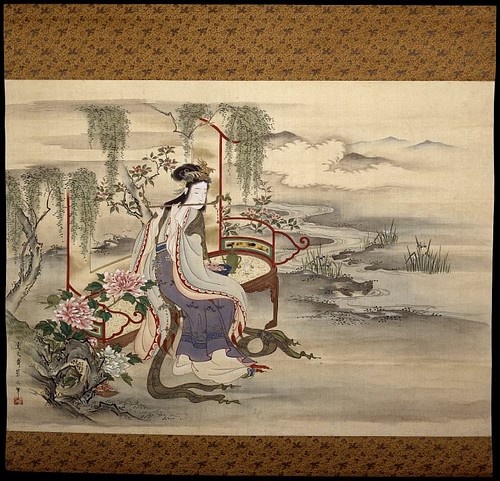
Bai Juyi (l. 772-846) was one of the greatest poets of the Tang Dynasty (618-907) along with Li Po (l. 701-762) and Du Fu (l. 712-770). He was a government official who got in trouble with authorities a number of times for not following the rules or doing as his superiors thought he should.
Bai Juyi could not be bothered to follow rules he felt were silly or illogical, though. He was a poet first and he followed his heart. Unlike Li Po, Bai Juyi is not very well known in the west but is very popular in China. He is best known for his poem Song of Everlasting Sorrow (also known as Abiding Remorse or Song of Everlasting Regret) which became very popular when he published it in c. 806 and remains so today. In China, the poem is still required reading in school.
Bai Juyi's simple style of writing, known as Yuanhe, was accessible and appealing to the masses (though not so much to the critics) and because of this, and his habit of publishing and distributing his own work, most of his poems have survived the centuries and continue to be admired today.
Early Life
Bai Juyi was born in Xinsheng County near the modern day capital of Henan Province, Zhengzhou, in 772. He came from a long line of scholars and government officials. His family was poor and struggled to make a living, but they made sure that Bai received an education. He was already writing poetry by the age of twelve when his family moved to another province because of political turmoil in their own.
At the age of sixteen, Bai traveled to Changan, the capital of the Tang Dynasty, to submit his poetry to a well-known poet named Gu Kuang. Gu was impressed by his work and recommended he take the Imperial Examination to work for the government. Many poets worked for the government because it was a steady job they could perform easily and it gave them time to write their poems. While Bai was studying for the exams, his father died and the family had no means of support.
Bai rushed his studies hoping to secure a job to help his family but wound up failing the exam. He took the required three years of mourning for his father and exiled himself to his ancestral home on the Wei River just outside of Changan. He devoted himself to poetry, and it was during this time, c. 806, that he wrote Song of Everlasting Sorrow. When his three years of mourning were up, he returned to Changan to take the exam which he passed at the age of 20.
He took a job as an archivist and became friends with other young poets who had recently passed the exam. One of these was Yuan Zhen (l. 779-831) the famous writer, poet, and scholar who would be Bai's closest friend. Yuan Zhen and Bai Juyi were both very outspoken and concerned with social injustice and political corruption. Even though they both worked for the government, they were not above criticizing officials they felt were abusing their positions. Yuan Zhen was more subtle in his writing and offered suggestions for improvement, but Bai Juyi expressed his feelings plainly in his poetry and this caused him problems more than once.
Poetry & Exile
He wrote a poem called On Stopping the War in response to what he saw as needless conflict and criticized a number of officials who were of higher rank than he was. When the Prime Minister Wu Yuanheng was assassinated in 815, Bai wrote a poem eulogizing him without waiting for those in higher positions to express their feelings first. This breach in protocol made him more enemies, who took the first chance they found to have him exiled.
Bai's mother died in 815 by falling down a well while looking at some flowers. Shortly after this, and prior to resigning his position to observe the three years of mourning, Bai published two poems, Admiring Flowers, and The New Well which his enemies claimed were violations of filial piety because he was using his mother's death for his own personal gain. Bai was found guilty, demoted, and exiled to the city of Xun Yang on the Yangtse River.
Here he again devoted himself to poetry and, when his time of mourning and exile was over, visited Yuan Zhen (who was also in exile) at Yichang. Their time together exploring caves and drinking ale and wine by the river became the subject of a number of Bai's later poems and, together, they perfected the Yuanhe style of writing they are associated with.
Government Work & Fame
In 819, Bai was called back to Changan to take a post as a government secretary. He held this position for a few years without any trouble, but in 821 he wrote a number of poems criticizing the emperor Muzong. The entire court of Muzong's administration was corrupt, and the emperor himself did nothing but drink all day and enjoy himself with his concubines. Bai Juyi's poems were not critical enough to warrant exile or more serious punishment but were still considered disrespectful. He was sent away from the court at Changan to Zhongzhou in Sichuan Province to take a minor position as Prefectural Governor.
By this time, Bai's poetry had become very popular. He wrote in an easy style which people could understand. It was said that he would read his poetry to his illiterate servants, and if there was a word or line which they did not understand immediately, he would simplify it.
Although the people loved his poetry, many critics did not; and for the same reasons. The literary critics of the time felt his poetry was too sensuous and simple and aroused emotions rather than offering a harmonious experience. Bai paid no attention to them and continued to have his work printed and distributed to the public.
He was appointed governor of Hangzhou in 822 and acted in the people's interests without following protocol or seeking counsel from those of higher rank. The farmers who lived around the area known as West Lake depended on a steady water supply for their crops but, because the local officials had been corrupt, the dike which regulated the water had collapsed. When Bai arrived he saw the people were suffering every day because of the ruined dike and had it rebuilt so it was better than the one before. He also ordered a walkway built across it so the people would no longer have to pay the high prices of the local ferryman to cross the lake.
Bai spent his free time writing poetry and visiting Yuan Zhen who held a government position nearby. He had also been promoted to the position of Imperial Tutor which came with a significant salary. He was married by this time, although his wife's name is unknown. In 829, his two-year-old son died and Yuan Zhen died soon afterwards in 831. Bai's time as governor was up and he retired to an estate at Luoyang. At some point after his son's death and his retirement, his wife must have died because there is no mention of her afterwards.
Retirement & Death
Bai Juyi had a great appreciation for nature and insisted that his estate should be mainly gardens. The scholar Charles Benn writes, "The residential quarters sat on only 18 percent of the property's nearly two and a half acres. The remainder of the tract was a garden with a lake (29 percent of the land) and an enormous bamboo grove (53 percent of the land)...After retiring from office, he set about the business of renovating his garden" (92). He built a granary which could store up to 1700 bushels of grain, a library for his huge collection of books, a pavillion for parties, and had three man-made mountains formed in his lake as a symbol of the land of the gods.
In the last years of his life, Bai entertained his friends and wrote poetry. He had his poems copied and distributed throughout the region. His two best known, Song of Everlasting Sorrow and Song of the Pipa Player were already famous and available in libraries and bookshops. His parties became major events which Benn describes:
Whenever he threw a party, he and his guests went for a sail on his pleasure boats. Trailing along behind the craft underneath the water were 110 waterproof sacks containing ale and roasted meat. Whenever the party exhausted the contents of one bag, the poet's attendants would retrieve another for the pleasure of his companions. Bai also had a troupe of ten singers, dancers, and musicians. When strumming of the zither was over and his guests were merrily drunk, he sent the entertainers to pavilions on the islands in the lake where they performed the introductory section of "Rainbow Skirt", a famous piece of music. (92)
After his retirement from government, Bai referred to himself as a hermit but continued to entertain people and write poetry until he suffered a stroke in 839. His poetry becomes more somber after this, and he had to stop entertaining guests. He died in 846 at the age of 75. He requested a simple grave near one of the nearby monasteries but was buried near the Longmen Caves, the famous grottoes of the hundred buddhas, and honored with a monument.
Poetry & Legacy
Bai Juyi wrote almost 3,000 poems in his life most of which were preserved because they were so popular. He is known as the "People's Poet" of the Tang Dynasty because, unlike Li Po or Du Fu, his work was accessible to everyone and his subject matter dealt with topics which were considered outside of the Confucian principles of respectable poetry.
Scholar Rewi Alley, the translator of Bai Juyi's best-known works in English, writes:
Bai regretted not having written more poems on social issues and not having invested those he wrote with greater conviction. One suspects, however, that a number of Bai's and Yuan's poems of social criticism were dropped from their collected works by later compilers. In fact, most of Yuan's poems in this genre have been lost, though many folios of Bai Juyi's have come down to us. It is interesting to note, too, that whereas it had been the custom for outstanding poets to be granted a posthumous title, this honour was denied Bai by the emperor. This suggests that his socio-political poems had hit their mark after all. (6)
Bai felt that the purpose of poetry, or any writing, was to promote social justice and understanding. Alley writes how he "held the conviction that the basic function of poetry was didactic - to inform the ruling class of the state of the people's lives" (6). He did not even consider his most famous poem, Song of Everlasting Sorrow, one of his best because it dealt with royalty and war instead of the working class and their struggles to live lives of dignity under corrupt governments.
Song of Everlasting Sorrow is a romanticized telling of the tragic love story of the Tang emperor Xuanzong (r. 712-756) and the Lady Yang. When the An Lushan Rebellion broke out during Xuanzong's reign, Lady Yang and her family were blamed. Xuanzong's military commanders refused to help put the rebellion down unless Yang and her family were executed, which was done.
In the poem, this event is set back in the Han Dynasty (202 BCE-220 CE) to make it more romantic. The story is the same, though: the emperor must allow his true love to be killed in order to win the war. Even though the poem touches on many themes Bai regularly explored, it deals with more elevated characters and situations than those he felt were his best works.
Not all, or even that many, of Bai Juyi's poems are sad or heavy. His short poem On Reading the Works of Laozi is not only funny but raises an excellent point. The philosopher Laozi (also known as Lao-tzu) is famous for the line, "Those who speak do not know; those who know do not speak." and yet is allegedly the author of the Tao Te Ching, a work of 5,000 words on Taoism. Bai Juyi says what plenty of people must have thought over the years in this poem:
I am told by Laozi
that those who talk know
nothing, while those with
real knowledge are silent;
people say that Laozi
really knew something; why then,
did he write those five thousand words?
His other poems are sometimes quiet descriptions of a scene or landscape, reflections on family and friends or starting a new job, word-pictures of the lives of the working class, or just observations on life. In his poem Haunted Houses he reflects on how silly people are to be afraid of homes which are haunted because "it is a man who creates/dangerous situations; a house of itself cannot"(Alley, 108). The people of Bai Juyi's time had a deep fear of ghosts and the problems they could cause the living. Bai Juyi was writing against tradition in criticizing the belief in ghosts and haunted places just as he went against custom in almost everything he did.
The poetic style created by Bai Juyi and shared with Yuan Zhen came to be known as Yuanhe which is a simple and direct way of writing which communicates instantly without a reliance on much symbolism or allusion. This style influenced all of the poets who came after him to different degrees and had a great impact on Japanese literature. The Tale of Genji by Lady Murasaki, Japan's great classic novel, cites Bai Juyi's work a number of times and its style also matches his. Bai's greatest legacy, though, was not just in creating an important and influential style of poetry but in making it acceptable for poets to write about real life as they saw it instead of life as people wanted or wished it could be.







